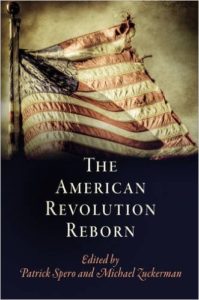 Praise for the American Revolution Reborn
Praise for the American Revolution Reborn
“The American Revolution appears in a fresh new light in this lively and wide-ranging collection of essays. The authors deftly explore a diverse and contested revolution rich in ironies and importance.”—Alan Taylor, author of American Revolutions: A Continental History, 1750-1804
“This is the most ambitious state-of-the-field collection published since the American Revolution’s bicentennial. Let’s hope it is successful in charting new directions and arousing fruitful debates.”—Thomas P. Slaughter, author of Independence: The Tangled Roots of the American Revolution
“The American Revolution Reborn is a state-of-the-field collection. Its essays rank among the best Revolutionary scholarship to emerge since the collapse of the republican synthesis. The authors reject heroic narratives, repudiate nationalist analyses, and blur the edges of allegiance, identity, and indifference.”—Benjamin H. Irvin, University of Arizona
“The essays in this volume are careful, thought-provoking, and highly effective, and the conclusion issues a challenging and pungent demand that we abandon our comfortable assumptions.”—Andrew Shankman, Rutgers University-Camden
About the American Revolution Reborn
The American Revolution conjures a series of iconographic images in the contemporary American imagination. In these imagined scenes, defiant Patriots fight against British Redcoats for freedom and democracy, while a unified citizenry rallies behind them and the American cause. But the lived experience of the Revolution was a more complex matter, filled with uncertainty, fear, and discord. In The American Revolution Reborn, editors Patrick Spero and Michael Zuckerman compile essays from a new generation of multidisciplinary scholars that render the American Revolution as a time of intense ambiguity and frightening contingency.
The American Revolution Reborn parts company with the Revolution of our popular imagination and diverges from the work done by historians of the era from the past half-century. In the first section, “Civil Wars,” contributors rethink the heroic terms of Revolutionary-era allegiance and refute the idea of patriotic consensus. In the following section, “Wider Horizons,” essayists destabilize the historiographical inevitability of America as a nation. The studies gathered in the third section, “New Directions,” present new possibilities for scholarship on the American Revolution. And the last section, titled “Legacies,” collects essays that deal with the long afterlife of the Revolution and its effects on immigration, geography, and international politics. With an introduction by Spero and a conclusion by Zuckerman, this volume heralds a substantial and revelatory rebirth in the study of the American Revolution.
